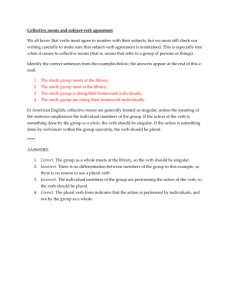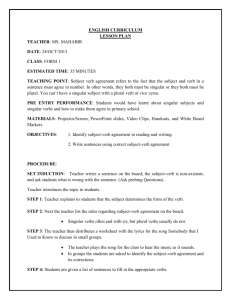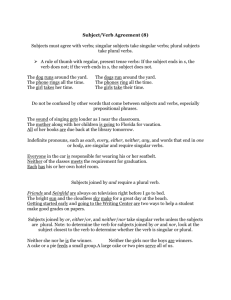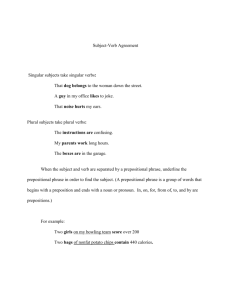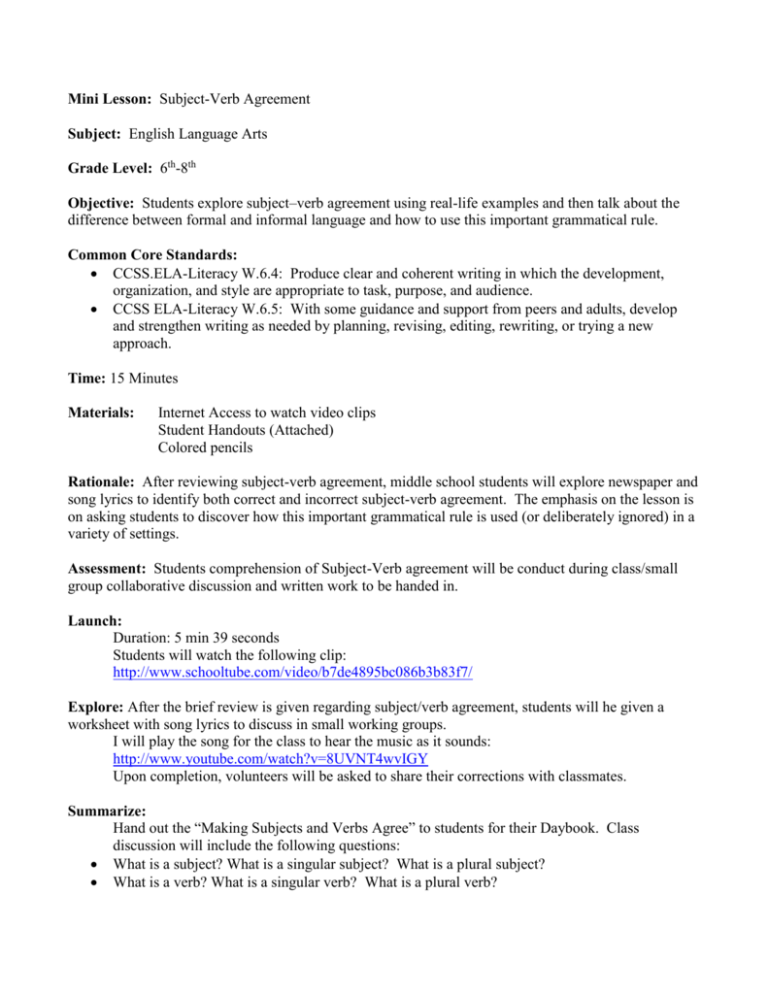
Mini Lesson: Subject-Verb Agreement
Subject: English Language Arts
Grade Level: 6th-8th
Objective: Students explore subject–verb agreement using real-life examples and then talk about the
difference between formal and informal language and how to use this important grammatical rule.
Common Core Standards:
CCSS.ELA-Literacy W.6.4: Produce clear and coherent writing in which the development,
organization, and style are appropriate to task, purpose, and audience.
CCSS ELA-Literacy W.6.5: With some guidance and support from peers and adults, develop
and strengthen writing as needed by planning, revising, editing, rewriting, or trying a new
approach.
Time: 15 Minutes
Materials:
Internet Access to watch video clips
Student Handouts (Attached)
Colored pencils
Rationale: After reviewing subject-verb agreement, middle school students will explore newspaper and
song lyrics to identify both correct and incorrect subject-verb agreement. The emphasis on the lesson is
on asking students to discover how this important grammatical rule is used (or deliberately ignored) in a
variety of settings.
Assessment: Students comprehension of Subject-Verb agreement will be conduct during class/small
group collaborative discussion and written work to be handed in.
Launch:
Duration: 5 min 39 seconds
Students will watch the following clip:
http://www.schooltube.com/video/b7de4895bc086b3b83f7/
Explore: After the brief review is given regarding subject/verb agreement, students will he given a
worksheet with song lyrics to discuss in small working groups.
I will play the song for the class to hear the music as it sounds:
http://www.youtube.com/watch?v=8UVNT4wvIGY
Upon completion, volunteers will be asked to share their corrections with classmates.
Summarize:
Hand out the “Making Subjects and Verbs Agree” to students for their Daybook. Class
discussion will include the following questions:
What is a subject? What is a singular subject? What is a plural subject?
What is a verb? What is a singular verb? What is a plural verb?
What is a pronoun?
What does it mean to have subject-verb agreement?
Can you think of any examples of songs, headlines, or quotes that lack subject-verb agreement?
What sounds better – a sentence with or without subject-verb agreement?
Does anyone know another language? If so, how does subject-verb agreement work in Spanish,
Italian, etc?
When you are grammatically correct in your writing and speech, what kind of impression do you
give? Likewise, when you are grammatically incorrect, what kind of impression do you give?
Extension Assignments: Challenge students to find examples in media (music, newspaper articles, ads,
etc) where subject verb agreement is not present. Students can complete the assignment found here for
more practice.
http://www.englishwsheets.com/subject-verb-agreement-1.html
Resources:
Celce-Murcia, M., & Larsen-Freeman, D. (1999). The copula and subject–verb agreement. In The
grammar book: An ESL/EFL teacher's course, (2nd ed., pp. 53-78). Boston: Heinle & Heinle.
Paiz, Joshua M. and Chris Berry. (2013) Making Subject and Verbs Agree.
http://owl.english.purdue.edu
NAME: __________________________
DATE: _______________ SCORE: ________
There are 15 verbs in the lyrics that do NOT agree with their subject. Underline the verbs that are incorrect and re-write
the majority of sentence below. The italics will repeat at the end of the song. Don’t worry if you don’t understand every
word, just find the subject and see if it has a matching verb.(HINT:The 1st column has 6 errors and the 2nd column has 9 errors)
Now and then I thinks of when we were together, like when you said you felt so
happy you could die.
I told myself that you was right for me, but (I) felt so lonely in your company.
But, that were love and it are an ache I still remember.
You can get addicted to a certain kind of sadness, like resignation to the end,
always the end.
So, when we found that we could not make sense, well you said that we would
still be friends, but I'll admit that I was glad that it were over.
But, you didn't have to cut me off,
(to) make out like it never happened and that we was
nothing.
And, I don't even need your love, but you treats me like a
stranger and I feel so rough.
No you didn't have to stoop so low
(to) have your friends collects your records and then
changes your number.
I guesses that I don't need that though.
Now you is just somebody that I used to know.
Now and then I thinks of all the times you screwed me over.
Part of me believing it were always something that I'd done.
But I doesn't want to live that way,
reading into every word you say.
You said that you could let it goes and I wouldn't catch you hung up on
somebody that you used to know.
1. I think of when we were together.
2. _____________________________________________________________________________
3.______________________________________________________________________________
4.______________________________________________________________________________
5.______________________________________________________________________________
6.___________________________________________________________________________
7. ____________________________________________________________________________
8. _____________________________________________________________________________
9. ______________________________________________________________________________
10._____________________________________________________________________________
11. _____________________________________________________________________________
12._____________________________________________________________________________
13. _____________________________________________________________________________
14. _____________________________________________________________________________
15. _____________________________________________________________________________
Answer Key
Now and then I thinks of when we were together,
like when you said you felt so happy you could die.
I told myself that you was right for me, but (I) felt so lonely in your company.
But, that were love and it are an ache I still remember.
You can get addicted to a certain kind of sadness, like resignation to the end, always the end.
So, when we found that we could not make sense, well you said that we would still be friends, but
I'll admit that I was glad that it were over.
But, you didn't have to cut me off, (to) make out like it never happened and that we was nothing.
And, I don't even need your love, but you treats me like a stranger and I feel so rough.
No you didn't have to stoop so low,
(to) have your friends collects your records and then (you) changes your number.
I guesses that I don't need that though.
Now you is just somebody that I used to know.
Now and then I thinks of all the times you screwed me over.
Part of me believing it were always something that I'd done.
But I doesn't want to live that way,
reading into every word you say.
You said that you could let it goes and I wouldn't catch you hung up on somebody that you used
to know
1. I think of when we were together.
2. You were right for me.
3. That was love.
4. It is an ache I still remember.
5. I was glad that it was over.
6. We were nothing.
7. You treat me like a stranger.
8. Your friends collect your records.
9. You change your number.
10. I guess that I don’t need that though.
11. You are just somebody.
12. I think of all the times.
13. It was always something that I’d done.
14. I don’t want to live that way.
15. You could let it go
Welcome to the Purdue OWL
This page is brought to you by the OWL at Purdue (http://owl.english.purdue.edu/). When
printing this page, you must include the entire legal notice at bottom.
Contributors:Joshua M. Paiz, Chris Berry, Allen Brizee.
Summary:
Ever get "subject/verb agreement" as an error on a paper? This handout will help you understand
this common grammar problem.
Making Subjects and Verbs Agree
This handout gives you several guidelines to help your subjects and verbs agree.
1. When the subject of a sentence is composed of two or more nouns or pronouns connected by
and, use a plural verb.
She and her friends are at the fair.
2. When two or more singular nouns or pronouns are connected by or or nor, use a singular verb.
The book or the pen is in the drawer.
3. When a compound subject contains both a singular and a plural noun or pronoun joined by or
or nor, the verb should agree with the part of the subject that is nearer the verb.
The boy or his friends run every day.
His friends or the boy runs every day.
4. Doesn't is a contraction of does not and should be used only with a singular subject. Don't is a
contraction of do not and should be used only with a plural subject. The exception to this rule
appears in the case of the first person and second person pronouns I and you. With these
pronouns, the contraction don't should be used.
He doesn't like it.
They don't like it.
5. Do not be misled by a phrase that comes between the subject and the verb. The verb agrees
with the subject, not with a noun or pronoun in the phrase.
One of the boxes is open
The people who listen to that music are few.
The team captain, as well as his players, is anxious.
The book, including all the chapters in the first section, is boring.
The woman with all the dogs walks down my street.
6. The words each, each one, either, neither, everyone, everybody, anybody, anyone, nobody,
somebody, someone, and no one are singular and require a singular verb.
Each of these hot dogs is juicy.
Everybody knows Mr. Jones.
Either is correct.
7. Nouns such as civics, mathematics, dollars, measles, and news require singular verbs.
The news is on at six.
Note: the word dollars is a special case. When talking about an amount of money, it requires a
singular verb, but when referring to the dollars themselves, a plural verb is required.
Five dollars is a lot of money.
Dollars are often used instead of rubles in Russia.
8. Nouns such as scissors, tweezers, trousers, and shears require plural verbs. (There are two
parts to these things.)
These scissors are dull.
Those trousers are made of wool.
9. In sentences beginning with there is or there are, the subject follows the verb. Since there is
not the subject, the verb agrees with what follows.
There are many questions.
There is a question.
10. Collective nouns are words that imply more than one person but that are considered singular
and take a singular verb, such as group, team, committee, class, and family.
The team runs during practice.
The committee decides how to proceed.
The family has a long history.
My family has never been able to agree.
In some cases in American English, a sentence may call for the use of a plural verb when using a
collective noun.
The crew are preparing to dock the ship.
This sentence is referring to the individual efforts of each crew member. The Gregg Reference
Manual provides excellent explanations of subject-verb agreement (section 10: 1001).
11. Expressions such as with, together with, including, accompanied by, in addition to, or as well
do not change the number of the subject. If the subject is singular, the verb is too.
The President, accompanied by his wife, is traveling to India.
All of the books, including yours, are in that box.
Copyright ©1995-2013 by The Writing Lab & The OWL at Purdue and Purdue University. All rights reserved.
This material may not be published, reproduced, broadcast, rewritten, or redistributed without permission. Use of
this site constitutes acceptance of our terms and conditions of fair use.



